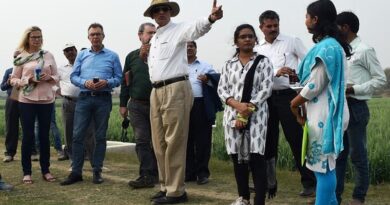Seeding innovation: Challenges that the Agritech startups are facing and overcoming
Guest Author – Pushkar Limaye, Co-Founder and CTO at Carnot Technology
31 July 2023, New Delhi: Pushkar Limaye, Co-Founder and CTO at Carnot Technology, talks about the challenges faced by Agritech startups in India.
The Indian Agritech market is projected to reach $24.1 billion by 2025, growing at a CAGR of 25% from 2020 to 2025. India has witnessed a surge in Agritech startups in recent years. As of 2021, there were over 450 Agritech startups in the country, focusing on various aspects of agriculture such as precision farming, supply chain management, farm management software, and market linkages.
In 2020 alone, Indian Agritech companies raised approximately $243 million in funding across 47 deals. This indicates growing investor interest in the sector. Technologies like satellite imaging, remote sensing, Internet of Things (IoT) devices, and data analytics are being used to optimize farming practices, improve yield, and reduce input costs.
Agritech companies in India are actively working to bridge the information gap and provide services directly to farmers. Mobile applications and digital platforms are being developed to disseminate agricultural knowledge, connect farmers with buyers, provide weather forecasts, and offer advisory services.
Agritech platforms are facilitating direct linkages between farmers and buyers, enabling efficient supply chain management. These platforms help farmers access a wider market, eliminate middlemen, and get fair prices for their produce.
Though there is an increased presence of technology in the agricultural sector, giving a boost to Agri-tech, startups in India still face many challenges unique to the sector. A few of these are:
1. Limited access to quality data: Availability and access to reliable and comprehensive agricultural data can be a significant challenge for Agritech startups. Access to data on weather patterns, soil conditions, market trends, and historical farming practices is crucial for developing accurate and effective solutions. However, such data may be fragmented, outdated, or not easily accessible, hindering startups’ ability to build robust and data-driven solutions.
2. Fragmented agricultural ecosystem: The agricultural sector in India is highly fragmented, consisting of smallholder farmers, diverse crops, and varying regional practices. This fragmentation makes it challenging for Agritech startups to scale their solutions across different regions and crops. Startups need to adapt their technologies and business models to suit the specific needs and constraints of different agricultural ecosystems.
3. Financial constraints: Access to funding and financial support is crucial for the growth and sustainability of agritech startups. However, early-stage startups may face challenges in attracting investment due to the perceived risks associated with the agricultural sector. Limited access to venture capital, high upfront costs for research and development, and long gestation periods for returns can pose significant financial constraints for startups.
4. Building trust: Farming in India often works on a credit basis, with multiplepeople involved at each step.These are channels that have survived for generations. Asking the farmers to trust a new entity outside of this trust circle is often a major challenge for any new start-up. Since agriculture at the grassroots level mostly comes down to a hand-to-mouth financial situation, it is not easy to persuade farmers to go for tech-based solutions that are alien to them.
5. Diversity in language, geography, and regional crops: India is home to more than 100 languages. In such a culturally and geographically diverse country, agritech startups need to focus on localised solutions. They may face communication barriers while offering solutions to farmers from different linguistic regions. Besides this, India is known for its diverse crop patterns. Agri-tech solutions need to keep these preferences and diversity in mind before deploying any solution at scale.
6. Climate change: We are currently witnessing the effects of climate change on agriculture in real-time. Recently, untimely rains have destroyed many crops, and we are witnessing the effects of the same in the supply chain, including inflation in prices, etc. This volatile weather situation is something that agri-tech start-ups need to handle. With patterns changing in as little as one year, they need to have solutions in place that are agile and robust. Besides this, the changing market dynamics, often a direct result of climate change, need to be taken into account as well. Market fluctuations, demand for specific crops, or the unavailability of certain crops can have a monumental effect on the solutions offered by agri-tech startups.
7. Fragmented value chain integration: The Indian agricultural sector is a complex machine with many moving parts. Agri-tech startups, though effective, focus on localised solutions or specific aspects of agriculture. These include tractor rentals, farm management, market linkage, supply chain efficiency, technology adoption, etc. One of the major challenges is to come together and integrate these solutions or collaborate with other players to ensure comprehensive solutions.
8. Financial aid: The credit system currently available at the grass-roots level to farmers often comes with steep interest. However, the new-age financial-aid solutions need to be aware of a farmer’s capability to repay the loan, which is not an easy task due to the erratic and seasonal nature of agriculture in India. Therefore, agri-tech startups need to come up with effective solutions for credit options. For the same reason, they need to have access to recent data and explore partnerships with forward-thinking financial institutions.
9. Land fragmentation: Contrary to developed countries like the US and UK, the average landholding size in India is small. Many small farmers make up the agriculture sector in India. This unique land fragmentation needs unique solutions.
10. Increasing competition: The agri-tech sector has now witnessed unprecedented growth. There are about 600 agri-tech start-ups in India. These not only include young players but also the agri-tech arms of established players and start-ups backed by eminent companies. This has led to increased competition in the sector, especially from players who have established networks, distribution silos, data, and deep pockets, making it challenging for agritech startups to stand out in a crowded market.
Addressing these challenges requires a combination of innovative business models, tailored solutions, collaboration with stakeholders, and proactive engagement with the agricultural community. Building the capacity of farmers and rural communities is crucial for the successful adoption of agritech solutions. Startups are organizing training programs, workshops, and demonstration farms to educate farmers on the use of technology, sustainable farming practices, and financial literacy. By providing hands-on training and creating awareness, they are empowering farmers to effectively utilize agritech tools and improve their livelihoods.
Agritech startups are forging partnerships with government agencies, research institutions, NGOs, and corporations to address the diverse challenges in the agriculture sector. Collaborative efforts help in accessing resources, scaling operations, conducting research and development, and creating a supportive ecosystem for innovation in agritech.
By combining technology, data-driven insights, and farmer-centric approaches, agritech startups in India are making significant strides in overcoming challenges and transforming the agricultural landscape for the better.
Also Read: Every farm in Madhya Pradesh will get irrigation water: CM Chouhan
(For Latest Agriculture News & Updates, follow Krishak Jagat on Google News)















